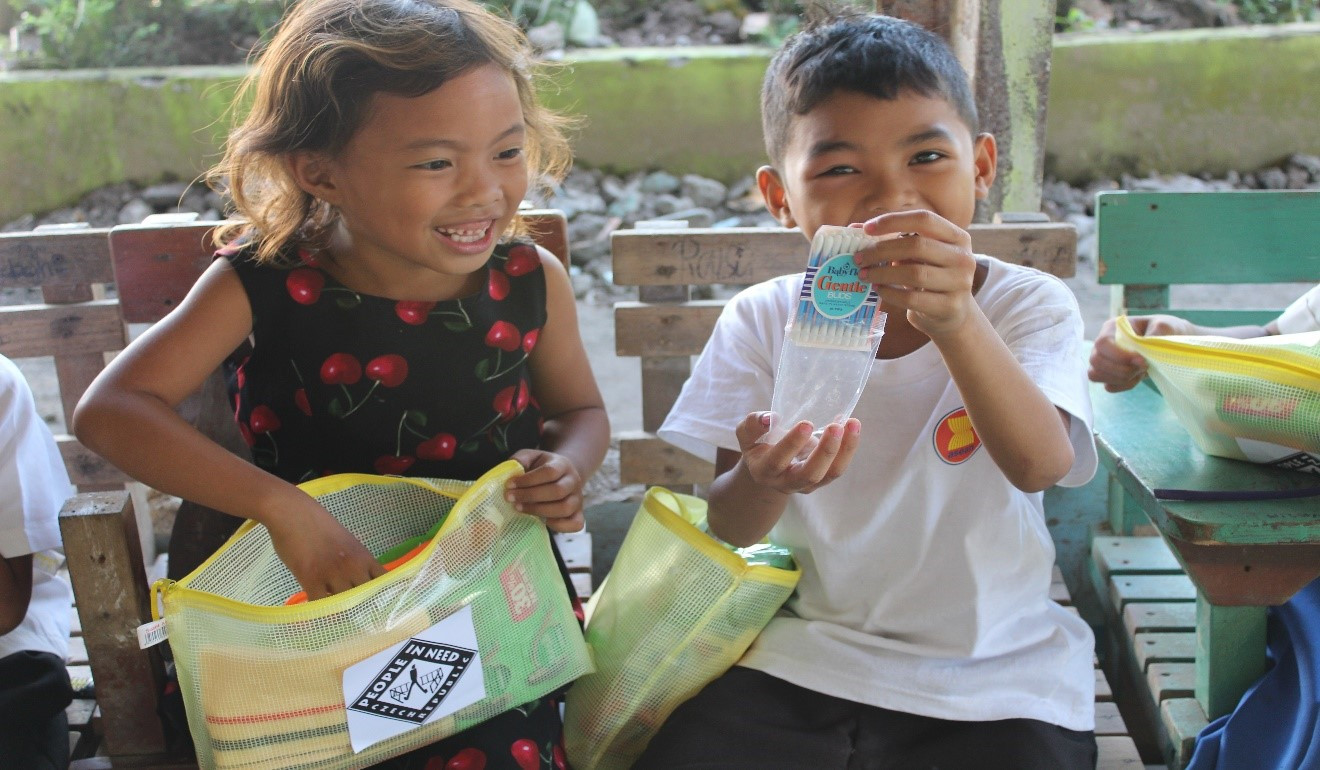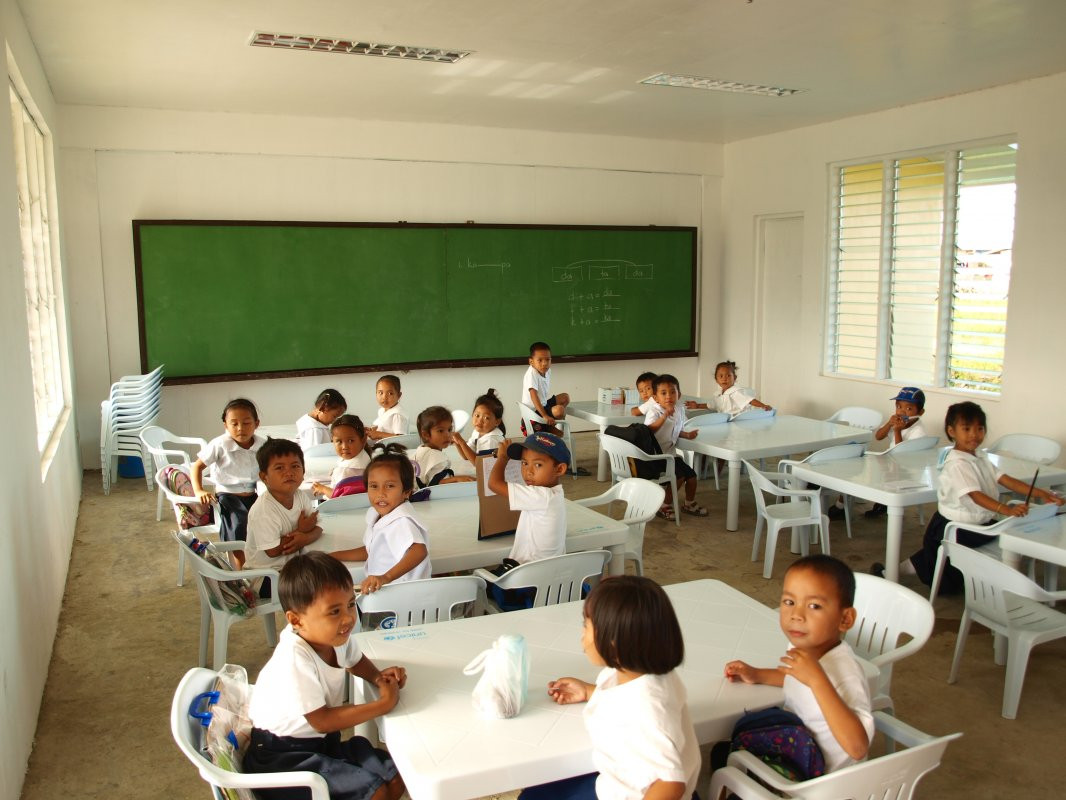Philippines: Emergency Response & Recovery
In 2017, the Battle of Marawi caused hundreds of thousands of people to flee their homes, resulting in the longest urban war in modern Philippine history.
We partnered with local organizations to assist young people affected by the conflict, distributing school uniforms, and providing legal advice and psychosocial support. Additionally, we offered sub-grants to local civil society groups and launched programs to empower youth to advocate for increased tolerance and respect for other religions and cultures. We have also taken steps to address the COVID-19 pandemic by engaging in information, education and communication campaigns that combat misinformation and prioritize public health and well-being.
Entire text
Less text
Past aid programmes

Assistance to people affected by the Vinta typhoon
On December 22nd 2017, tropical storm Vinta developed from a low pressure area east of the Philippine province Surigao del Sur. Extreme rainfall caused by the storm resulted in flash floods and landslides in Lanao del Norte, Lanao del Sur and Zamboanga del Norte regions. The floods and landslides caused considerable damage to local infrastructure.
Distribution of sanitary kits were the main priority as the spread of contaminated water posed great risk of disease for displaced children.
As many farmers and small retailers were completely deprived of their livelihoods, PIN supported employment for local people in the most affected areas clearing debris and cleaning public houses. The income earned from these jobs can cover the cost of food or allow them to pay school fees for children and young adults. Single parents and women leading households without the help of a male partner were prioritized for the jobs.
Distribution of sanitary kits were the main priority as the spread of contaminated water posed great risk of disease for displaced children.
As many farmers and small retailers were completely deprived of their livelihoods, PIN supported employment for local people in the most affected areas clearing debris and cleaning public houses. The income earned from these jobs can cover the cost of food or allow them to pay school fees for children and young adults. Single parents and women leading households without the help of a male partner were prioritized for the jobs.

Supporting students after the crisis in Marawi
The crisis in the city of Marawi, Lanado del Sur Province on the Philippine island Mindanao broke out on May 23rd, 2017 with an armed conflict that ultimately resulted in displacement of nearly 400, 000 people.
Rebels who declared their support to the so-called Islamic State took control of the city towards the end of May 2017. The conflict escalated when the Philippine government embarked on an operation to catch one of the Islamist leaders. The biggest urban war in modern history of the Philippines lasted 6 months and cause damage of an estimated 20 billion Philippine Pesos (CZK 8,7 billion).
Since October 2017, People in Need has been helping displaced children get back in school so they can get back to the lives they had been living before the crisis. PIN supported students by providing them with school uniforms, which are mandatory in local schools. Together with local partner organisations we provided psychological support and helped to recover lost personal documents such as birth certificates, ID cards and school reports that are needed to enrol in school.
Rebels who declared their support to the so-called Islamic State took control of the city towards the end of May 2017. The conflict escalated when the Philippine government embarked on an operation to catch one of the Islamist leaders. The biggest urban war in modern history of the Philippines lasted 6 months and cause damage of an estimated 20 billion Philippine Pesos (CZK 8,7 billion).
Since October 2017, People in Need has been helping displaced children get back in school so they can get back to the lives they had been living before the crisis. PIN supported students by providing them with school uniforms, which are mandatory in local schools. Together with local partner organisations we provided psychological support and helped to recover lost personal documents such as birth certificates, ID cards and school reports that are needed to enrol in school.

Rapid Livelihood Recovery
We supported the poorest and most vulnerable families to resume their former income generating activities, preventing them from having to resort to negative coping mechanisms such as borrowing money, child labour or reduced consumption of nutritious food. The PIN team in cooperation with the target communities selected the 445 most vulnerable households in 10 villages of the Guiuan district and provided them with conditional cash grants for purchase or rehabilitation of productive assets.
In this way the worst affected families could start regular work again and recover their self-sufficiency. The cash transfers were complemented with training in the field of business and technical skills, and awareness-raising workshops on the topic of livelihood protection and simple DRR measures. Most of our beneficiaries invested in animal raising, crop production and small businesses such as running pedicabs, eateries, tailoring workshops, small shops or bakeries.
In this way the worst affected families could start regular work again and recover their self-sufficiency. The cash transfers were complemented with training in the field of business and technical skills, and awareness-raising workshops on the topic of livelihood protection and simple DRR measures. Most of our beneficiaries invested in animal raising, crop production and small businesses such as running pedicabs, eateries, tailoring workshops, small shops or bakeries.

Schools Rehabilitation
One of the main priorities was to get children back to school as soon as possible, to restore routine and normalcy. School buildings were twice as damaged compared to other public buildings and in Eastern Samar alone Typhoon Yolanda destroyed 168 schools. In the first phase, PIN team provisionally roofed the schools and cleared away the rubble and broken trees from their surroundings.
In early 2014, we started with full and permanent reconstruction of school buildings – we have provided them with new roofs, solidified roof structure, equipped rooms with doors and windows, and new toilets. 66 school buildings with 125 classrooms have been completely reconstructed and each of them equipped with sanitary facilities (either built or reconstructed). 46 of the classrooms have been significantly repaired (mainly roof, doors and windows) and 79 classrooms fully reconstructed. Our help has made it possible to educate over 4,800 children in a suitable environment.
In early 2014, we started with full and permanent reconstruction of school buildings – we have provided them with new roofs, solidified roof structure, equipped rooms with doors and windows, and new toilets. 66 school buildings with 125 classrooms have been completely reconstructed and each of them equipped with sanitary facilities (either built or reconstructed). 46 of the classrooms have been significantly repaired (mainly roof, doors and windows) and 79 classrooms fully reconstructed. Our help has made it possible to educate over 4,800 children in a suitable environment.

Cash for Work
The initial distribution efforts were quickly replaced by cash for work programme. In the short term, we provided people with emergency income so they could cover their basic needs - to buy food, clothes and materials to repair their homes or recover their businesses. We supported over 6,800 families engaged in removal of debris from public spaces, roads and agricultural lands and renovation of public infrastructure while supporting local markets. The cash for work programme was complemented with unconditional cash transfers for the most vulnerable households.
The majority of the supported families used their earnings and cash grants to purchase food and building materials to repair their homes. PIN team focused also on remote and almost inaccessible areas (upland areas and distant islands) where clearing roads of fallen trees and repairing damaged bridges allowed people again to access markets and assistance from actors. In 2014, PIN introduced a coconut lumber reclamation component which allowed the communities to make use of the wood for reconstruction their homes.
The majority of the supported families used their earnings and cash grants to purchase food and building materials to repair their homes. PIN team focused also on remote and almost inaccessible areas (upland areas and distant islands) where clearing roads of fallen trees and repairing damaged bridges allowed people again to access markets and assistance from actors. In 2014, PIN introduced a coconut lumber reclamation component which allowed the communities to make use of the wood for reconstruction their homes.
.

Rapid Humanitarian Assistance in the immediate aftermath of Typhoon Haiyan
When typhoon Haiyan hit the Philippines in November 2013, PIN responded with immediate humanitarian aid. More than 6,000 people lost their lives during the natural disaster and millions of others were left without a roof over their heads. Eastern Samar and its southern part were among the worst affected regions with 90% of infrastructure destroyed.
PIN’s humanitarian team focused on providing life-saving assistance to the worst affected people on Bantayan Island. PIN immediately organised distribution of food for 10,000 of the most affected people. The second priority was to secure temporary shelters for families left homeless. Together with RAFI Foundation, PIN distributed material for constructing temporary shelters for 5,000 people.
PIN’s humanitarian team focused on providing life-saving assistance to the worst affected people on Bantayan Island. PIN immediately organised distribution of food for 10,000 of the most affected people. The second priority was to secure temporary shelters for families left homeless. Together with RAFI Foundation, PIN distributed material for constructing temporary shelters for 5,000 people.

